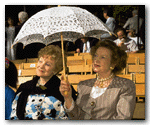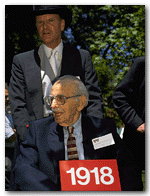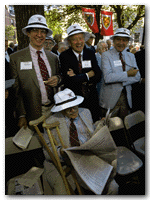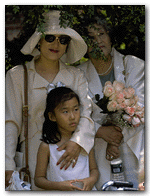Main Menu · Search · Current Issue · Contact · Archives · Centennial · Letters to the Editor · FAQs
![]()
Main Menu · Search · Current Issue · Contact · Archives · Centennial · Letters to the Editor · FAQs
![]()
| Commencement Day, 1996 | Medical Dean |
| Money Maven | Hail, Fellow! |
| New Pathway Extended | Seeger of Truth |
| Heard at Harvard | The Undergraduate |
| Crimson on the Tube | Sports |
| Phillips Brooks House | The University |
Commencement Day Articles
Duck Story · The Day Itself · Honoris Causa · Let There Be Awe
"Gone Outta Here" · Learning On Line · Commencement Confetti · The Return of the Obstinate
![]()
The Internet can transform teaching and learning, said President Neil L. Rudenstine in his address to alumni on Commencement afternoon. (See the full text of President Rudenstine's address)
What are the implications [of the Internet] for higher education? Are the changes significant, and are they likely to be long-lasting? If so, why?
From one point of view, the Internet marks just one more point on a long continuum of inventions. But certain events along a continuum can represent moments of real transformation, and I believe that the emergence of the Internet is one of them.
 |
| Mrs. George H. Fitch, left, of San Francisco, and her sister, Mrs. David Bune, of London, came to the party to watch their nephew, Anthony Charles Edwin St. George, of Boston, receive a Ph.D. degree in Chinese and Korean pre-modern literature. |
As early as the eighteenth century, Diderot remarked that "a time will come when�the printing press, which never rests, [will fill] huge buildings with books�. [Eventually] the world of learning-our world-will drown in books." A German treatise on public health warned in 1795 that excessive reading induced "a susceptibility to colds, headaches, weakening of the eyes, heat rashes, gout, arthritis, asthma, apoplexy, pulmonary disease, indigestion, nervous disorders, migraines, epilepsy, hypochondria, and melancholy." Most of all, it was feared that excessive reading would take the place of direct human contact, and could well lead to a society composed of certified antisocial misfits.
 |
| Joseph Goldstein '18 of Brookline, Massachusetts, at 101, was the senior alumnus on hand on Commencement afternoon. |
Some of these concerns can be alleviated by recalling our research libraries and their evolution. Other concerns-such as the worry that the Internet may be no more educationally useful than radio or television-need to be answered differently.
Let me suggest some of the main reasons why I believe that the Internet is already having-and will continue to have-such a major effect on higher education.
To begin with, there is in fact a very close fit between the structures and processes of the Internet, and the main structures and processes of university teaching and learning-which does not exist with radio, film, or television. I mean that students can carry forward their work on the Internet in ways that are tightly intertwined with the traditional ways that they study and learn in libraries, classrooms, discussion groups, laboratories, and other settings.
Let me suggest a few examples.
The Internet can provide access to vast sources of information not conveniently obtainable
 |
| Stalwarts of the class of '46: standing, from left, James Harper, M.B.A. '48, of New York City, Rev. John Crocker Jr. of West Kingston, Rhode Island, and Gordon Allen Jr. of Carpinteria, California. Seated is Malcolm Rudolph of Palm Beach. |
If we shift to the formal curriculum, we can see that the Internet can provide unusually rich course materials on-line. For instance, traditional text-based business school "cases" are already being transformed. Students [have] to analyze not just a text and statistics, but also the whole range of attitudes, expressions, and behavior-recorded on video-of the different people at [a] plant. The viewer has to bring to bear all the skills of a careful observer of human nature, along with those of an operations analyst, a financial analyst, and a scholar of organizational behavior. The course and its texts can now be reinforced-indeed, enhanced-by Internet technology.
The Internet [also] allows certain kinds of conversational learning to be transferred easily and flexibly into electronic form. Communication can be carried on at all hours, across distances. Study groups can work together on-line; faculty members can hold electronic office hours in addition to their "real" office hours; and teaching fellows can moderate after-class electronic discussions.
Finally, the Internet may well be having a subtle but significant effect on the relationships among students, faculty members, and the materials being studied. Since at least the 1870s, the emerging theories of education have stressed the role of the student as an energetic learner. In this model, the faculty role is to draw students out, to steer but not explicitly control the discussion unless it becomes necessary to do so.The faculty also organizes the curriculum, but course materials are not likely to be treated as "authoritative texts." They're intended to be approached critically, and are usually arranged in a point-counterpoint way. The Internet virtually requires that the user be an engaged agent, constantly formulating new questions and pursuing them into unexplored terrain. Students are invited to trace linkages from one source to another. They can easily share ideas with others, and solicit criticism or comments, through e-mail or electronic discussion groups. And they generally act or pursue, rather than merely react and absorb.
 |
| Family members of Thomas Ho-min Kang '96, of Adams House and Newark, Delaware: from left, his aunt, Sung-ryung Kwon, her daughter, Yung-ji Kim, and his grandmother, Myung-he Min, all of Seoul. |
There is always reason for caution when things are changing so quickly. It takes time and money to create superior course materials. It also takes considerable faculty expertise. It will take time before the Internet is easily navigable and holds material that can even begin to rival our greatest research libraries.
But these things will happen and education will be enriched. Meanwhile, I believe that universities have a special responsibility to exert real leadership in the imaginative and thoughtful uses of the best technology for better teaching and learning. We must be prepared to do over the next 10 to 20 years what our predecessors achieved when they made a conscious decision to create unrivaled university research libraries, new curricula, and new teaching methods.
Is there a cautionary note on which to end? Certainly. Good data, new information, and excellent vehicles for communication do not in themselves constitute the essential stuff of education. As we know, education is a fundamentally human process. It is a matter of values and significant action, not simply information or even knowledge. The Internet will not show us-any more than our libraries full of books will show us-how to create a humane and just society. For this, we need-as we have always needed-human minds, human values, and human determination.
Main Menu · Search · Current Issue · Contact · Archives · Centennial · Letters to the Editor · FAQs
![]()
Harvard Magazine · 7 Ware Street · Cambridge, MA 02138 · Phone (617) 495-5746